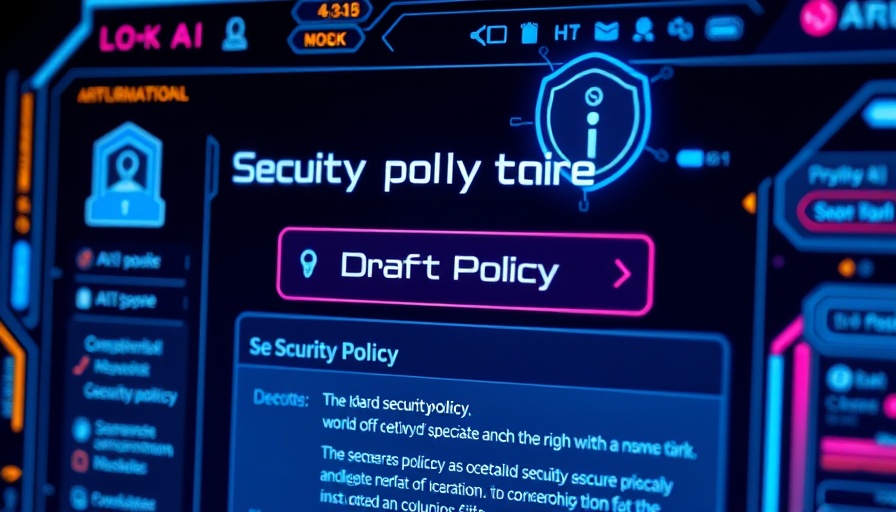
Revolutionizing Cybersecurity: Microsoft’s New AI Agents
In a bold move to enhance cybersecurity measures, Microsoft has unveiled a lineup of artificial intelligence agents designed to automate repetitive tasks and streamline workflows for security professionals. These innovations, presented during a recent announcement, aim to bolster the efficiency and effectiveness of the company's Security Copilot service, which initially launched in April 2024. By integrating these AI capabilities, Microsoft is not only addressing the increasing demand for effective cybersecurity solutions but also responding to the evolving challenges faced by organizations today.
Six New AI Agents Tailored for Security Professionals
The release includes six new AI agents developed by Microsoft, complemented by five partners' agents. Among these, the Phishing Triage Agent stands out, capable of filtering out false phishing alerts—all essential in a landscape where cyber threats are rampant. Furthermore, the Conditional Access Optimization Agent provides direct assistance to administrators managing access rights through Microsoft Entra, effectively highlighting weak links in security protocols and suggesting immediate remedies.
Additionally, the Vulnerability Remediation Agent enhances device management via Microsoft Intune, allowing companies to swiftly address vulnerabilities that could lead to serious breaches. The Threat Intelligence Briefing Agent rounds out this impressive roster by generating reports on potential threats sourced from Microsoft’s extensive collection of data, which exceeds 84 trillion data points daily.
Beyond Automation: The Bigger Picture
While automation plays a pivotal role in streamlining cybersecurity operations, the introduction of these agents also reflects a shift towards proactive security measures. Vasu Jakkal, Microsoft's corporate vice president of security, aptly noted that these agents not only prioritize risks but also empower security teams to respond faster and more effectively. This proactive stance can potentially transform how organizations approach security—moving from reactive to a highly proactive model.
The Role of Partner-Developed Agents
In tandem with Microsoft’s internally developed tools, the five partner-built agents bring additional value to Security Copilot. For instance, Aviatrix’s agent enhances network troubleshooting, while OneTrust's tool aids in navigating complex privacy regulations. This collaboration is a key element, underlining the importance of diverse solutions in a multi-faceted threat landscape.
Enhancements Across Microsoft's Cybersecurity Portfolio
This update to Security Copilot is part of a broader push to enhance Microsoft’s cybersecurity offerings. Edge for Business has been revamped to restrict sensitive data entry into chatbots, with plans to extend similar protections to desktop environments through new integrations. Moreover, the updates also include significant improvements to Defender for Cloud, which plays a crucial role in safeguarding cloud applications against unauthorized access and attacks.
Implications for Organizations and Security Teams
The integration of AI into cybersecurity solutions presents vast opportunities not just for large enterprises but also smaller organizations that often find themselves as easy targets for cybercriminals. By adopting these agents, organizations can expect not just to improve their immediate response times, but also to foster a culture of security awareness and resilience among their teams, ultimately strengthening overall security postures.
Looking Ahead: Navigating an Evolving Threat Landscape
The announcement comes at a critical juncture; cyber threats are growing more sophisticated and prevalent. With Microsoft’s innovative approach through AI, organizations are better equipped to navigate these challenges. As businesses increasingly rely on technology, embracing advancements like Security Copilot's new features will be vital in maintaining robust defenses.
Microsoft’s bold steps in enhancing Security Copilot signify a crucial shift in how organizations can leverage AI to reinforce their cybersecurity frameworks. Now, more than ever, investing in such technology is imperative to safeguard digital assets effectively.
Join the Conversation on AI Advancements
As we continue to explore how AI is shaping the future, it's essential for security teams and organizational leaders to stay informed about these developments. Understanding the capabilities and direction of AI in cybersecurity can lead to more strategic decisions and investments, positioning your organization for success in an increasingly complex digital landscape.
 Add Row
Add Row  Add
Add 




 Add Row
Add Row  Add
Add 

Write A Comment